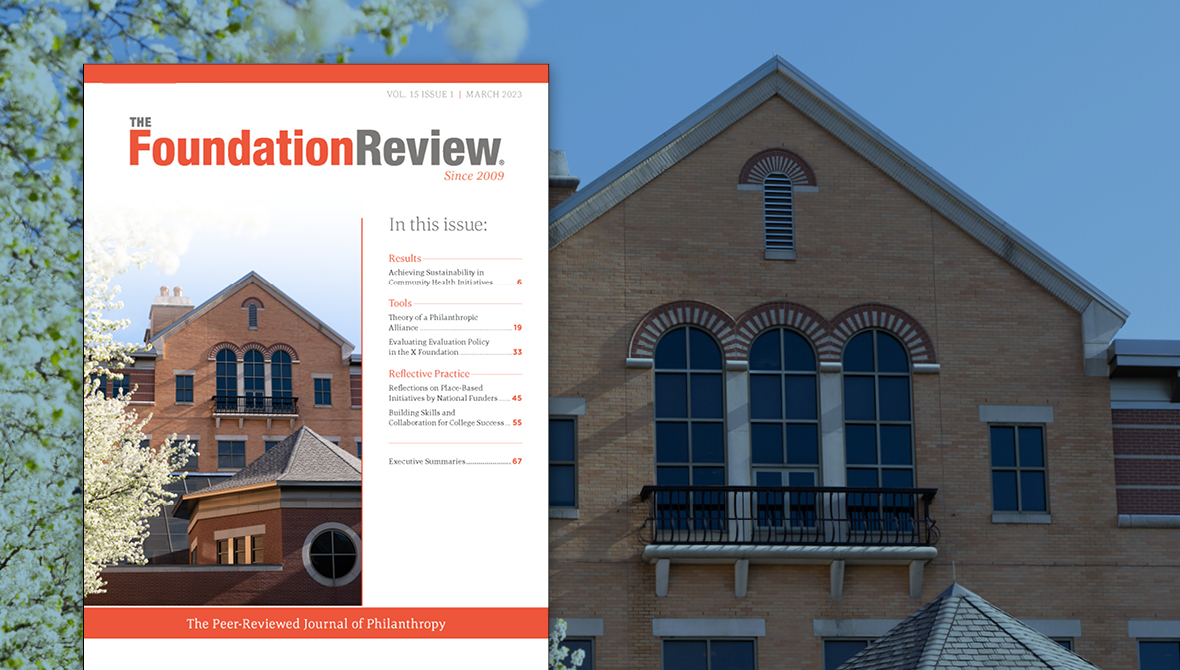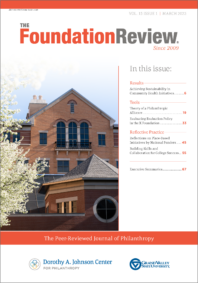Collaboration at the Heart of Community Transformation


 This issue of The Foundation Review highlights several ways foundations can support collaboration among nonprofits and communities to increase and sustain the impact of programs and initiatives over time.
This issue of The Foundation Review highlights several ways foundations can support collaboration among nonprofits and communities to increase and sustain the impact of programs and initiatives over time.
The U.S. health system’s “sick care” model — as designed — currently spends $4.3 trillion annually to treat its people once they become ill, yet it has done little to meaningfully advance their health and well-being. In fact, research consistently demonstrates that socioenvironmental factors and individual behaviors have a far greater impact on health outcomes. Responding to this research, in 2017 the Episcopal Health Foundation launched the Texas Community-Centered Health Home Initiative. The $10 million, multiyear investment was a proactive, developmental effort to build the capacity of community-based clinics to go beyond clinical services to address the conditions that would enhance the health of its residents. This article outlines how the foundation’s adaptive approach in conjunction with its focus on identifying and influencing the interest and direction of public and private payers demonstrates the potential to achieve sustainable practices in community prevention. Lessons learned point to the role philanthropies can play by assuming an adaptive approach in guiding their initiatives and in leveraging learning and grant investments to create not only community-level impact but also to influence state and national funding policy to generate sustainable funding options.
Different kinds of action entities need different theoretical frameworks. A theory of change hypothesizes how an intervention is expected to achieve desired impacts in the world. A theory of philanthropy articulates a foundation’s role in supporting specific kinds of theories of change. This article extends that analysis to a theory of philanthropic alliance, which explains and hypothesizes how several foundations working together can have a greater collective impact than they could working separately. A theory of philanthropy will be contrasted with a theory of philanthropic alliance, using the Global Alliance for the Future of Food to illustrate and illuminate the distinction and its importance for understanding collective action among foundations. While the Global Alliance is this article’s specific case example of a theory of philanthropic alliance, the framework elements may be relevant to any collective effort by multiple foundations, grantees, communities, organizations, networks, or other collaborative entities.
Evaluation policies, which are becoming increasingly important for philanthropic foundations, communicate internally and externally about how evaluations are planned, designed, and managed. An evaluation policy also prescribes how the use of evaluation systematically reflects the mission and role of a foundation. This article describes how an evaluation policy was developed at a Danish grantmaker committed to supporting innovative methods in human services, and answers two questions: What might an evaluation of an evaluation policy look like in practice? How did the foundation react to the evaluation and its recommendations? The process inspired reflections on strategy and identity within the foundation and initiated rethinking of the complex relations between evaluation policy and practice and of the foundation’s relations to grantees and recipients of services. This article shows how a systematic revision of a foundation’s evaluation policy can be organized and how it can contribute to change, but also how it can lead to deeper reflections about dilemmas involving values, strategy, and foundation-grantee relations.
Much of central Appalachia has experienced an outflow of people, skills, and capital and as a consequence has been one of the models for community failure going back for over a century. But there are growing numbers of people and organizations that do not accept this fate as inevitable. Using a developmental approach called place-based funding, supported by national and regional foundations and led by community groups and innovative practitioners located in and near the region, the Appalachian Investment Ecosystem Initiative is helping communities build a new way forward. Designed to accelerate investments in rural communities, this joint venture by LOCUS Impact Investing and regional partners including Invest Appalachia, the Appalachian Funders Network, and the Central Appalachian Network identified gaps that were preventing successful business development in economically distressed communities. That led to the creation of a training, support, and technical assistance program to fill the gaps. This article presents an exploration by one person who spent over 40 years in philanthropy — much of it focused on rural places — on the role of place-based funding and reflections on how national and nonresident funders can be more supportive.
From 2018 through 2020, the Jamie and Denise Jacob Family Foundation made grants to 17 youth development organizations in Detroit that were at varying levels of readiness to advance college success outcomes with their program alumni. At the same time, it was funding three collaborating capacity-building organizations to structure and facilitate a professional learning community that would support the youth programs in improving outcomes for striving students. This article discusses a framework and recommendations for how grantmakers can extend their impact by engaging capacity builders to facilitate cross-organizational collaboration and learning as they start a portfolio aimed at moving community-level outcomes. This article also outlines the motivation for the foundation to support this collaborative learning model and offers an overview of its goals, process, and key learnings. For family foundations initiating a new portfolio, it can seem daunting to invest in relationship building and technical assistance on the front end, but this learning community’s outcomes indicate that planning and preparation can contribute significantly not only to developing the best programmatic approaches but also to positive, sustainable, long-term outcomes for young people and communities.
Not yet a subscriber to The Foundation Review?
Start your free 90-day trial today!